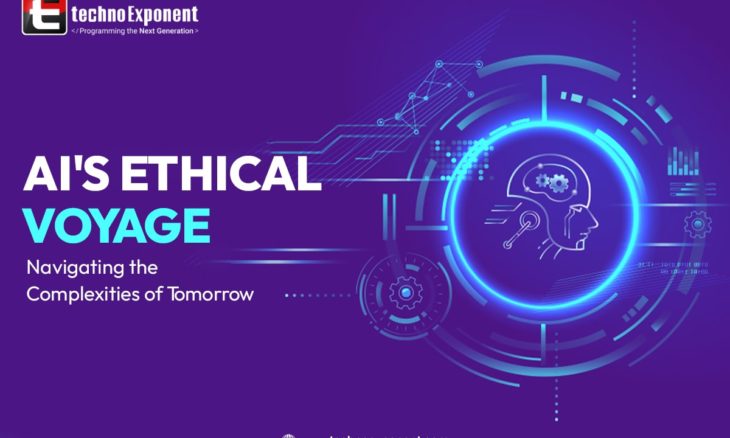
The ever-evolving landscape of Artificial Intelligence (AI) embarks upon a world of both wonder and trepidation. Excitement ensues while uncertainty looms. The growing question remains – as AI permeates every aspect of our lives, do we ethically steer its course?
The Potential of AI
AI, the realm of intelligent machines that think, learn, and act autonomously, extends across robotics, computer vision, natural language processing, and machine learning. Its promise lies in redefining how we interact with technology and revolutionizing our daily lives. The crux of AI is creating systems capable of decision-making based on received data, spanning from recognizing images to strategizing games.
As AI endeavors to create machines that comprehend their surroundings, predict outcomes, and act without explicit human programming, ethical concerns surface. The landscape is laden with intricate questions of responsibility, fairness, and safeguards in real-world applications. For instance, in the context of an autonomous vehicle causing an accident due to a programming error, or an individual being wrongly assessed for potential future criminal activities – who shoulders the responsibility?
The realm of AI permeates diverse facets, from ChatGPT text and image generation to social media classifiers, thereby molding our societal and cultural structures. This prompts a critical reflection on the underlying ethical issues and their profound impact on our ongoing and upcoming projects.
Navigating Ethical Quandaries in AI
Biases and Accountability
AI’s propensity for automation and decision-making isn’t immune to biases. When algorithms and data sets are complex and opaque to human understanding, inherent risks of bias emerge, leading to erroneous decisions. The poignant case of Amazon’s flawed AI system for job candidate evaluation vividly highlights the perils of bias. The inability to render gender-neutral ratings was a stark revelation, underscoring the limitations and errors inherent in machine learning.
The Black Box Problem
The opacity in AI systems, popularly known as the ‘black box’ conundrum, poses a challenge. These systems are opaque in their decision-making processes, complicating the understanding of their inner workings. This lack of transparency makes it difficult to trust AI decisions, potentially leading to mistakes without a comprehensible moral code. The consequences could be dire, especially in critical applications like medical diagnostics, where accountability is paramount.
Efforts are directed towards developing ‘explainable AI’ to provide intelligible results. Until we achieve interfaces that unravel the enigma behind AI’s decision-making, caution is imperative in handling their outputs.
Human Error and Ethical Ramifications
The proposed use of AI for automated facial recognition systems to predict criminality from single photographs is a striking example of the ethical predicaments that AI innovation poses. The potential for discrimination and ethnic profiling underlines the need for meticulous scrutiny. The allure of novel technology often eclipses the vital consideration of ethical implications and societal impacts.
Privacy in AI: Balancing Data Use
AI’s use in data collection and processing raises ethical concerns regarding the gathering and usage of vast volumes of personal data without explicit user consent. This data then trains AI algorithms for varied applications, from targeted advertising to predictive analytics. These practices raise questions about data protection and privacy, notably in their ability to discern sensitive information from user behavior patterns.
For instance, AI can decode online shopping habits, potentially uncovering political or religious leanings. Stricter adherence to data protection regulations like GDPR becomes crucial to secure explicit user consent before data collection, maintain transparency, and ensure adequate security measures to prevent unauthorized data access.
The challenge lies in understanding the ethical implications of using personal data to train AI algorithms. Clarity and transparency are paramount, ensuring that AI decisions are fair, unbiased, and promote privacy while benefiting society at large.
Security Challenges in AI
As AI systems gather and analyze data, the potential for its misuse by malicious actors escalates. The risks span from identity theft to manipulation of public opinion through AI-driven algorithms. The need for stringent security measures, consistent with cybersecurity best practices, is imperative to protect user data from misuse.
Impact on Employment: Mitigating Job Displacement
The adoption of AI-driven automation raises concerns about job displacement, potentially leading to economic instability and increased unemployment. Historical references, such as the Industrial Revolution, highlight adaptive measures essential for a transitioning workforce. Keeping abreast with AI technology’s developments and focusing on skill sets not easily replicated by machines remains key to mitigating job displacement.
Charting the Path Forward in AI Ethics
A widespread public education initiative is indispensable, ensuring comprehensive awareness of AI’s implications and risks. Organizations deploying AI solutions must balance the benefits of the technology with user privacy and security, emphasizing the need for oversight and regulation to address accountability and ethical responsibilities.
The establishment of a regulatory framework ensures companies’ accountability and justifies AI systems’ decisions, fostering ethical, fair, and responsible AI implementation.
 +44 141 628 8980
+44 141 628 8980
 (786) 269-2247
(786) 269-2247
 +61 872007153
+61 872007153
 +91 8900027268 (Sales only)
+91 8900027268 (Sales only)








